Long Read
Sedentary Revolutionaries: Two Academics Who Joined the Nazi Party
No private personal ambition is involved; he simply wishes to obey a sovereign whose legitimacy he will not question.
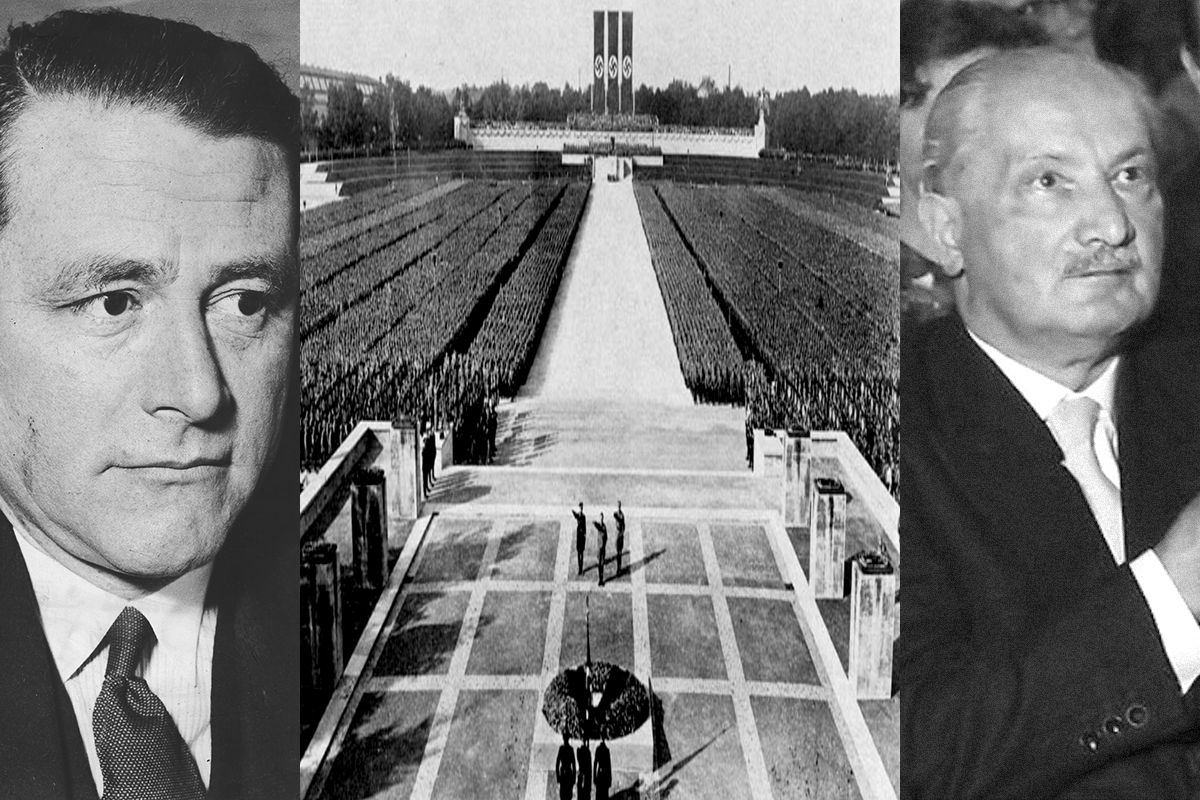
Carl Schmitt (1888–1985) and Martin Heidegger (1889–1976), two of the most prominent German thinkers of the twentieth century, became members of the Nazi Party in 1933, and briefly held positions of some prominence after Adolf Hitler became Chancellor of Germany. Heidegger spent just over a year as Rector of the University of Freiburg (1933–1934); Schmitt spent the years 1933 to 1936 as the “Crown Jurist of the Third Reich” whilst teaching law in Berlin. After the end of the Second World War, neither man publicly explained or apologised for his earlier political activities.
In spite of his close association with Nazism, Heidegger’s reputation as one of the twentieth century’s preeminent thinkers has never faded: he ranks with Ludwig Wittgenstein (1889–1951) as one of the most influential philosophers since Nietzsche, and he has enjoyed particularly widespread admiration in France; prominent thinkers including Jean-Paul Sartre (1905–1980), Maurice Merleau-Ponty (1908–1961), and Jacques Derrida (1930–2004) have all learnt from (and struggled with) Heidegger’s notoriously difficult oeuvre.
Schmitt’s work, on the other hand, fell into relative eclipse after the war. But his essays on legal and political theory have grown steadily in popularity over the past half-century. Almost all of his important work is now available in English, and has enjoyed renewed attention with the rise of populist political movements in America and across Europe. In the Anglosphere, Schmitt’s most important current champion is probably Adrian Vermeule, a law professor at Harvard who converted to Catholicism in 2016 and has recently become an unlikely Twitter celebrity with his sardonic attacks on liberalism.
The neoconservative political philosopher Harvey Mansfield has criticised Vermeule for his attempt to rehabilitate Schmitt’s profoundly illiberal ideas about executive power and the administrative state. But neoconservatives’ influence is waning on the American Right. Vermeule’s Schmittian anti-liberalism, meanwhile, is in the ascendant among American conservative intellectuals, who are increasingly disenchanted with classical liberalism’s perceived failure to protect Christians from what is seen as an aggressively anti-Christian culture.
Schmitt’s adversarial view of politics has something superficially in common with the ideas of the former Trump Administration official Michael Anton (author of “The Flight 93 Election”) and the Catholic writer Sohrab Ahmari (whose First Things essay “Against David Frenchism” has proved controversial for its embrace of an overtly confrontational approach to cultural politics). But neither Anton nor Ahmari appears to have been directly influenced by Schmitt: Anton’s intellectual hero remains Leo Strauss (1899–1973), who openly opposed Schmitt; Ahmari is too philosemitic to have time for the writings of a Nazi party member. Nevertheless, Schmittian ideas are once again in the air, as can be seen in journals such as American Affairs, First Things, and the Claremont Review of Books.
Schmitt’s and Heidegger’s activities in the 1930s are often excused on the grounds that these unworldly professors joined the Nazi Party out of naivety, academic careerism, or complete miscalculation. They grew up in a world where suspicion of Jews was commonplace, it is said, and never found occasion to reflect seriously on their own prejudices or paranoia. Such explanations are unsatisfactory. Still, Nazism was only one of several contemporary movements informed by (or based on) overtly antisemitic doctrines. It does not fully explain Schmitt’s or Heidegger’s ideas or political choices.
Antisemitism attributes to Jews extraordinary power, influence, and wickedness. Over the centuries, its tropes have been adapted to scapegoat Jews for a wide variety of problems, from localised outbreaks of illness to economic depressions and international wars. The politicised variant that flourished in Europe during the late nineteenth and early twentieth centuries began in the wake of the revolutions of 1848, and intensified with the French defeat in the Franco-Prussian War (1870–1871). The central preoccupation at this time was Jews’ perceived predominance in banking, commerce, and industry.
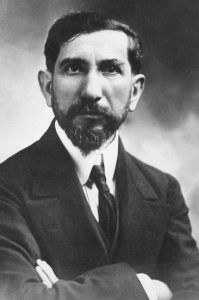
The most influential antisemitic political theorist during this period was Charles Maurras (1868–1952), a French poet and literary journalist best known in the English-speaking world for his influence on T.S. Eliot. Maurras was a nationalist who argued that France’s interests could only be defended in the long term by a power that was independent of political cabals or the influence of money. He was preoccupied with the influence, not only of Jews, but also of Freemasons, Protestants, and métèques (immigrants) on French society.
Maurras did not disguise his visceral hatred of Jews; but he found theories of “Aryan purity” fatuous, and was intellectually opposed to biological or “scientific” racism. Instead of recommending the expulsion of Jews, he suggested that they be allowed to live in France, albeit as second-class citizens with limited political rights and some form of royal protection. He consistently denounced Nazism, and loathed Hitler; but this was in part because he simply hated Germans. Despite this, Maurrassian ideas had a considerable impact on the German “Conservative Revolutionary Movement.”
“Conservative Revolutionaries” were proudly nationalist, openly authoritarian, and often profoundly antisemitic; although they generally rejected Nazi racial theories and mythology in favour of the more cultured reactionary traditionalism offered by Italian fascism or Maurrassian monarchism in the wake of Germany’s defeat in the First World War. Notwithstanding their membership of the Nazi Party, it seems fairest to describe Carl Schmitt and Martin Heidegger as supporters of this tradition, which was also associated with many of the best known German and Austrian writers, including the novelist Thomas Mann (1875–1955), the poet, playwright, and librettist Hugo von Hoffmanstahl (1874–1929), and the historian Oswald Spengler (1880–1936).
These eloquent (if sedentary) revolutionaries tended to despise Nazis. But they thought they could gain power through a tactical alliance with them, and so often became their apologists and enablers. They assumed that their superior minds and educations would automatically ensure that they maintained control over the Nazi vulgarians. The Night of the Long Knives (30 June–2 July, 1934) demonstrated this to be a fantasy. The Conservative Revolutionary movement is now little known in the English-speaking world except among scholars. Yet there is much to learn from its adherents’ spectacular failure to contain the threat of Nazism, or to draw a distinct line between overtly Nazi principles and their own.
Carl Schmitt, “Intellectual Adventurer”
Born into a modest Catholic family in a Protestant part of Germany, Carl Schmitt was initially interested in classical philology, but ended up studying law at the universities of Berlin, Munich, and Strasbourg. Whilst training as a jurist he continued to read widely. His earliest work available in English, Political Romanticism (1919), is a provocative and original study of the Romantic movement, which he criticises as involving an aestheticization of all spheres of culture, a “poeticization” of political conflicts, and a reduction of political debate to a mere endless conversation. This essay turns out to be a biting attack on fundamental elements of liberalism in the guise of a critical literary disquisition.
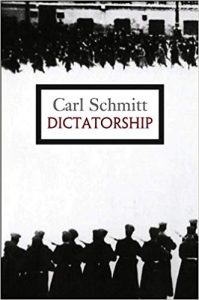
Schmitt’s 1921 book Dictatorship is a tour de force of historical erudition. Within its pages, Schmitt traced the history of dictatorship in theory and practice, from its origins in ancient Rome as a temporary emergency safeguard for the constitution, to the development of the concept of “sovereign dictatorship” (or a dictatorship in the sense that we now tend to use the term) in the nineteenth century. This work is of particular importance because it prepares the ground for all Schmitt’s best known essays in political theory. He introduces ideas that will develop into “decisionism,” a doctrine based on the premise that every human grouping requires a sovereign who has a duty to decide what to do in an extreme or exceptional situation. A sovereign’s decision is valid as long as it has been made in the correct way, by the proper authority. Nothing else matters.
Schmitt’s professional situation was precarious until he was awarded a professorship at the University of Greifswald in 1921. There he rapidly produced three of his most important essays: Political Theology (1922), Roman Catholicism and Political Form (1923), and The Crisis of Parliamentary Democracy (1923; published 1926). In Political Theology, Schmitt claims that “all significant concepts of the modern theory of the state are secularised theological concepts.” He underlines the need for a strong state to ensure order, peace, and stability, and expands further on his concept of sovereignty with the dynamic of protection and obedience: as long as a sovereign is in a position to protect his subject, his subject is bound to obey him. The essay begins arrestingly: “sovereign is he who decides on the state of exception.” In other words, the sovereign is the one who decides whether there is an emergency, as well as what must be done about it.
The Crisis of Parliamentary Democracy is a highly critical engagement with classical liberal concepts of parliament, and the system of institutionalised “government by discussion,” as well as the idea that you can get at the truth simply through reasonable, rational discussion and the possibility of compromise. Roman Catholicism and Political Form is a Maurras-inspired exploration of the Catholic Church as a political and cultural institution. At the time, Schmitt was increasingly frustrated with the “celibate bureaucracy” of the Church, and officials’ refusal to grant him an annulment, and eventually fell in love with the 19-year-old woman who acted as translator during his divorce case. He married her in 1926. Meanwhile, he was beginning to see Mussolini as a possible ideal ruler.

Schmitt developed a sideline in the emerging field of political science; in 1927, he published the first edition of The Concept of the Political, perhaps his most widely studied essay. This is where he fully articulates his adversarial concept of politics. For Schmitt, the concept of the State presupposes the concept of the political. He defines a State as the political status of an organised people in an enclosed territorial unit. Further: “the specific political distinction to which political actions and motives can be reduced is that between friend and enemy.”
In 1928, Schmitt published his longest work, Constitutional Theory, a masterly synoptic overview of common problems in constitutional jurisprudence and political philosophy. His growing intellectual prestige and professional prominence inevitably led to political influence. He was ambitious in his pursuit of a public career, and saw that he might finally have his chance. However, he dealt with the resulting pressure in unusual ways. According to his biographer Reinhard Mehring, that year he watched Carl Theodor Dreyer’s silent film The Passion of Joan of Arc at least a dozen times in various cinemas. More than once he picked up a prostitute to watch it beside him in the dark.
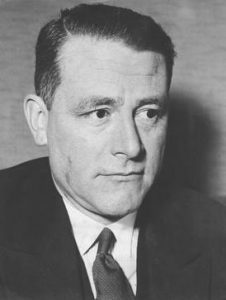
Schmitt was consistently bigoted against Jews, and this is made evident in the diaries he kept throughout his life. Yet he kept this mostly to himself until around 1932, when his views began to darken noticeably. In the 1920s, he had dismissed Adolf Hitler as a “hysteric.” But when Hitler became Chancellor of Germany at the end of January 1933, Schmitt began to sever his remaining friendships with Jews, and formally joined the Nazi Party in April 1933.
Schmitt was not opposed to a dictatorship; only he would have preferred one led by his mentor General Kurt von Schleicher (1882–1934), the last Chancellor of the Weimar Republic. Schleicher and his wife were murdered during the Night of the Long Knives. In the aftermath, Schmitt wrote a paper entitled “The Führer Protects the Law.” He claimed that “the Führer protects the law against the worst forms of abuse when, in a moment of danger, he instantly creates law by force of his character as Führer—the supreme legal authority.”
Schmitt never had much influence on the Nazis. All the same, he was regarded outside Germany as their official philosopher and éminence grise behind the scenes, at least by appalled émigrés and refugees. His influence was particularly overestimated in Italy, where Mussolini granted him an audience in 1936. But the Nazis themselves did not trust him. In an attempt to strengthen his position in the Nazi Party, Schmitt organised a conference in 1936 on the subject of how to eliminate Jewish influences from German jurisprudence. He called for the “purification of libraries,” suggesting that Jewish books be isolated in a segregated, guarded “Judaica” section of libraries, and referred to only by some separate system of citation for Jewish authors.
In 1937, Schmitt was forced to resign all his official positions within the Nazi legal establishment. He had been “exposed” as an opportunist who did not really believe in Nazi racial theories, and was saved from persecution only by Hermann Göring’s personal intervention. He was allowed to keep his professorship in Berlin until the end of World War Two, but was otherwise considered disgraced. In the autumn of 1945, he was arrested and detained by the Allies for a year, but avoided a trial for war crimes. He presented himself to his interrogators as a mere “intellectual adventurer” rather than a Nazi apologist.
Schmitt continued to write prolifically throughout his retirement; his later works, including Nomos of the Earth (1951), Hamlet or Hecuba (1956) and Theory of the Partisan (1963), are less well known than his essays of the 1920s, though Hamlet or Hecuba in particular maintains a growing readership. Jan-Werner Müller’s 2003 study A Dangerous Mind: Carl Schmitt in Post-War European Thought details just how surprisingly deep and wide Schmitt’s influence is, not least on anti-liberal left-wing philosophers in continental Europe.
Schmitt’s authoritarianism is beyond dispute, as is his antisemitism; the main question is not whether or not he was a Nazi, but whether or not his pre-1933 and post-1937 writings are tainted beyond redemption. (His work between 1933 and 1937 is undoubtedly contaminated with Nazism, of course.)
For an idea of the problems with Schmitt’s work, readers may now consult The Tyranny of Values, and Other Texts, edited by Russell Berman and Samuel Garrett Zeitlin (Telos Press 2018). This anthology provides an ideal introduction to the sheer range of Schmitt’s thought and erudition, from a brilliant 1927 essay on Machiavelli to a May 1969 radio interview with a Maoist intellectual on Schmitt’s theory of the “partisan.”
Schmitt wrote stylishly and with a light touch on politics, international law, current events (the United Nations, the Cold War), intellectual history (Hobbes, Rousseau), classical literature, modern art, and the work of his friend Ernst Jünger (1895–1998). The best and the worst of Carl Schmitt is exemplified by his long 1942 essay “The Forming of the French Spirit via the Legists.”
For the most part, “The Forming of the French Spirit” is lucid, elegant, and convincing. There is much to learn from this study in cultural and intellectual history; Schmitt’s ideas about French literary classicism are unusual and provocative. The sticking point comes in the middle of an excursus on the French jurist Jean Bodin (1530–1596). Schmitt spends the better part of a page assuring the reader that Bodin’s mother was not in fact a Spanish Jewess, and that this rumour was a “smear” that emerged over 70 years after Bodin’s death:
…it could admittedly acquire a semblance of credibility because a famous scholar… who was in general a great admirer of Bodin’s, perpetuated it and because in the posthumous religious dialogue Heptaplomeres the Jew Salomo comes off well. Bodin had indeed strongly “judaised” and had shown a great interest in Jewish-rabbinic learnedness. However that was generally shared among the humanists of his time and still proves nothing related to Jewish or half-Jewish descent. Both in this religious dialogue as well as in numerous other expressions from his books and letters Bodin displays a wholly un-Jewish piety far removed from any zealotry, from any chosenness-madness and which in a movingly modest way withdraws from the screaming of the theological controversies to prayer and patience… After the results of the most recent archival research no one can any longer call into doubt his purely French descent from the soil-based Angevine people….
Later in the same essay, Schmitt uses a point about the Dreyfus Affair to criticise what he saw as Jewish attempts to provoke a German equivalent:
When in the postwar period some organised attempts were made primarily by Jews to stage something similar in Germany and to make the so-called cases of Fechenbach, Bullerjahn, and others into German Dreyfus Affairs, this demonstrated nothing other than a truly pitiful misunderstanding, indeed the complete lack of relation of the Jewish spirit to the German people.
Finally, Schmitt mentions with approval a January 1936 protest in Paris against the law professor Gaston Jèze, during which students cried out “Death to the Jew Jèze!”
Readers who wish to ignore elements like these will find there are more than a few of them throughout Schmitt’s oeuvre. Such features combine uncomfortably with his conspicuous post-war silence on the Holocaust and the continuing antisemitism of his private diaries. Schmitt regarded his support for the Nazi Party as a mere miscalculation or tactical error of sorts. He had a telling exchange in 1947 with Robert Kempner (1899–1993), who served as assistant U.S. Chief Counsel during the International Military Tribunal at Nuremberg, having fled Germany in 1935:
SCHMITT: I wanted to give the term National Socialism my own meaning.
KEMPNER: Hitler had a National Socialism and you had a National Socialism.
SCHMITT: I felt superior.
KEMPNER: You felt superior to Adolf Hitler?
SCHMITT: Intellectually of course. He was so uninteresting to me that I do not want to talk about that at all.
KEMPNER: When did you renounce the devil?
SCHMITT: 1936.
Martin Heidegger
Controversies involved with Martin Heidegger’s membership in the Nazi Party are well known in the English-speaking world, thanks to Heidegger’s pervasive influence on postmodern and post-structuralist thinkers. His work is difficult to describe succinctly to anybody who has not spent time trying to read it. For those who admire it, the attraction is best encapsulated by Hannah Arendt’s 1969 description of what it was like to be taught by Heidegger:
What was experienced was that thinking as a pure activity—and this means impelled neither by the thirst for knowledge nor by the drive for cognition—can become a passion which not so much rules and oppresses all other capacities and gifts as it orders them and prevails through them. We are so accustomed to the old opposition of reason versus passion, spirit versus life, that the idea of a passionate thinking, in which thinking and aliveness become one, takes us somewhat aback.
Heidegger has literary as well as philosophical imitators. As with Nietzsche and Wittgenstein, he had a distinctive manner of expressing himself. His prose is opaque and uniquely difficult. The critic Mark Lilla describes it in his 2001 collection of essays The Reckless Mind: Intellectuals in Politics as “mythopoeic.” Heidegger’s stylistic models seem to include the Romantic poet and philosopher Friedrich Hölderlin (1770–1843) as well as the pre-Socratic Greek philosophers, whose work often survives only in random, enigmatic fragments.
The greatest German-language poet of the postwar period, the Romanian-born Paul Celan (1920–1970), owned 33 heavily annotated copies of Heidegger’s books. James K. Lyon’s noteworthy 2006 study Paul Celan and Heidegger: an Unresolved Conversation explores the fraught relationship between the two men. They finally met in 1967, as was commemorated in Celan’s untranslatable poem “Todtnauberg.” Heidegger wanted to take Celan to the mouth of the river Danube and show him the landscape that had been so powerfully described by Hölderlin; but before he could do so, Celan drowned himself in Paris. His parents had died in the Holocaust, and the guilt of his survival never ceased to torment him.
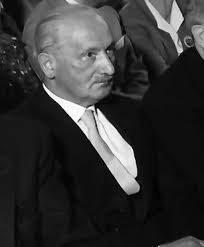
Heidegger’s relationship to the Nazis remains more ambiguous than Schmitt’s. The best introduction to the subject remains Richard Wolin’s 1991 anthology (revised for legal reasons in 1993) The Heidegger Controversy. Donatella di Cesare’s new study Heidegger and the Jews: The Black Notebooks is also essential reading, not just on account of all the valuable background material, but also because di Cesare has been able to analyse Heidegger’s recently published “Black Notebooks” from 1931 to 1948, in which the philosopher’s antipathy to Judaism and conspiratorial antisemitism are plain to see.
Commentators have often dismissed or even denied allegations that Heidegger was an antisemite. Alastair Hamilton’s classic 1971 survey The Appeal of Fascism rightly ignores an unsubstantiated rumour of Heidegger’s mistreatment of his Jewish former mentor, although Hamilton did not have access to private correspondence or diaries demonstrating the philosopher’s deep-seated dislike for Jews. George Steiner’s brief introduction Heidegger (1978; revised third edition 1991) does not skirt around the topic of Nazism; but Steiner could not find proof of antisemitic leanings in Heidegger’s published oeuvre. With the discovery of the “Black Notebooks,” such innocence becomes impossible.
Heidegger was a sexton’s son. Like Schmitt, he came from a modest Catholic background and eventually lost his faith. He entered the Jesuits at the age of 20, hoping to train as a priest, but left after two weeks. For two years, he studied theology at the University of Marburg. As late as 1920, he was willing to describe himself, improbably, as a “Catholic theologian”; though he had been distancing himself from the Church for a decade, with ever-growing contempt and bitterness.
Heidegger’s interest in philosophy began with Aristotle and his mediaeval interpreters and commentators. The ex-priest Franz Brentano (1838–1917) was a particular influence; although after he left the Jesuits, Heidegger became obsessed with the work of Brentano’s famous pupil Edmund Husserl (1859–1938), who established the study of “phenomenology.” From 1916, he began to study formally with Husserl at the University of Freiburg, and became his assistant in 1919. The following year, Husserl’s wife introduced Heidegger to Karl Jaspers (1883–1969) as Husserl’s “phenomenological child.” But in 1923, Heidegger left Freiburg to teach at the University of Marburg. His relationship with Husserl quickly soured.

At Marburg, Heidegger became renowned as a lecturer. The published version of his 1924/25 course on Plato’s Sophist (1992; English translation by Richard Rojcewicz and André Schuwer 1997) gives some idea of why his students were captivated by him. Indeed, all of his available lectures on Plato, Nietzsche, and Hölderlin provide an accessible introduction to his philosophy. They give evidence of a nimble, powerful mind; though it is often next to impossible to pin down precisely what he is saying.
In 1927, Heidegger published his long, demanding text Being and Time, which is widely regarded as one of the masterpieces of modern philosophy. He dedicated it to his former mentor Husserl. The following year, he moved back to Freiburg to take up Husserl’s chair in philosophy. They now openly resented each other.
Husserl retired officially in 1929; in 1933, he was suspended by the Nazis and not allowed to take part in any university activities on account of his Jewish blood. When Husserl died in 1938, Heidegger declined to attend the funeral. In 1941, he removed the dedication to Being and Time. His treatment of his old mentor is far from exemplary. Still, there are many potential reasons for him to have been cold-hearted or passive-aggressive towards the man to whom he owed his career.
Heidegger’s apparent enthusiasm for the Nazis seems to have begun in 1931; whatever he believed, by the end of that year he was willing to support them publicly. Jewish students and admirers including Hannah Arendt confronted him with rumours of his open antisemitism, which he seems to have been unable convincingly to deny. Soon he would begin ending his letters with “Heil Hitler,” although this may have simply been politically expedient for a man campaigning to be made Rector of the University of Freiburg.
On 21 April 1933, Heidegger became Rector; on 1 May, he registered as a member of the Nazi Party; the following year, on 27 April, he resigned as Rector. During his year in that post, he campaigned enthusiastically (if idiosyncratically) for the Nazis. Many of his admirers have suggested that he was trying to change and guide the Nazis from within, failed catastrophically, and then resigned from the rectorship in shame and frustration that he had been so naïve and ineffectual. Thereafter, he retreated into “pure philosophy,” spending as much time as he could at his secluded chalet at Todtnauberg in the Black Forest. In this version of events, Heidegger was idealistic and short-sighted, nothing more.
After the end of World War Two, Heidegger had a nervous breakdown. In 1946, he was barred from teaching. In 1951, he was reinstated by the university, but his chair in philosophy was not restored. His old student Herbert Marcuse (1898–1979) tried in vain to get him to say something —anything—in public to dispel rumours and suspicions about his Nazi past. Finally, in 1966, he granted an interview to Der Spiegel in which he was willing to discuss the subject, on condition that all questions be submitted to him for advance approval, and that it not be published until after his death. The interview is remarkable for its failure directly or substantially to address important questions.
Until the publication of the “Black Notebooks,” evidence of Heidegger’s antisemitism was equivocal. Karl Jaspers claimed in 1933 to have heard him talking about a “dangerous international alliance of Jews.” His comments about Jews in private correspondence amount to relatively mild, commonplace bigotry. At last there is undeniable evidence of his anti-Judaism and antisemitism in the “Black Notebooks.” In 1940 and 1941, he even refers to “international Judaism” and “world Judaism,” using the language of classic antisemitic conspiracy theory. The problem, as always with Heidegger is: what does this mean, and what does it prove?

Donatella di Cesare marshals a great deal of evidence in Heidegger and the Jews, and for the most part lays it out with admirable clarity to demonstrate that Heidegger was indeed an antisemite in the strong sense of the term. He had no obvious personal aversion to Jews, as many of his students have attested. Di Cesare is correct to approach Heidegger’s anti-Judaism and antisemitism in metaphysical terms, but she fails to prove that antisemitism was central or foundational to Heidegger’s philosophy.
So far, three of four volumes of the “Black Notebooks” have already been published in English by the University of Indiana Press, thanks to the indefatigable translator Richard Rojcewicz. Readers without German can see for themselves that decisive evidence of Nazi leanings is unlikely to be found in these characteristically opaque reflections. In the end, there is little tangible evidence to convict Heidegger of ideological Nazism, but plenty to convict him of embracing some very bad ideas, and a few instances of shocking indifference to suffering.
In the collection Poetry, Language, Thought (edited and translated by Albert Hofstadter, 1971), Heidegger famously wrote: “he who thinks greatly must err greatly.” Donatella di Cesare notes the philosopher’s fondness for quoting a line from the poet and philosopher Paul Valéry (1871–1945): “Those who cannot attack the thought attack the thinker instead.” The oblique self-defence may be telling.
The Authoritarian Dilemma
Carl Schmitt was never indicted for his collaboration with the Nazis, but he actively resisted “de-Nazification,” and so effectively barred himself from returning to academia. Martin Heidegger, on the other hand, tried to defend himself to the De-Nazification Committee. Although he was stripped of his status for a few years, he was never detained as Schmitt was. Then again, there is proof that he was not completely truthful with the De-Nazification Committee about his record.
Schmitt is commonly thought to be more dangerous than Heidegger. His open hostility to classical liberalism and liberal democracy are not unique, and plenty of other philosophers have shared his bleak view of human nature. The real anxiety involves the doctrine of decisionism, and what you commit yourself to if you accept Schmitt’s view of sovereignty, and agree that the decisions of a sovereign are sacrosanct in and of themselves. Heidegger’s views are not so obviously dark; his radical originality as thinker can still make for thrilling reading. Yet the very resistance of his thought to easy analysis makes it hard to demonstrate decisively how it might be incompatible with the blunt doctrines of Nazism.
There is no reason to suspect that any of Schmitt’s or Heidegger’s current intellectual admirers are flirting with antisemitism. Adrian Vermeule is notably cautious when referring to Schmitt’s work, and careful to distance himself from anything Schmitt wrote after he joined the Nazi Party. He engages critically with Schmitt’s insights and observations rather than treating them as simply authoritative. Unlike Schmitt’s anti-liberalism, Vermeule’s derives from his understanding of Christian orthodoxy rather than from naked power as in Schmitt’s Nazi-era writings.
And yet, Vermeule is a controversial figure among conservative and traditionalist Catholics, because he consistently defends the unorthodox and disruptive Pope Francis, and attacks those who criticise him. Vermeule’s attitude of complete submission and fidelity to the Pope bewilders those who do not share his serenely militant obedience, which looks remarkably like adherence to a Catholic version of Schmittian decisionism. No private personal ambition is involved; he simply wishes to obey a sovereign whose legitimacy he will not question.
But the danger of decisionism lies precisely in its surrender to authority, if it precludes critical examination of authority’s doctrines. Some of Weimar Germany’s finest minds allowed themselves ultimately to be led into complicity in almost unimaginable crimes. Anti-liberal intellectuals would do well to bear this in mind as they explore the nature of power.






